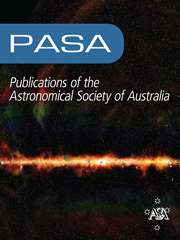Article contents
An Automated DIMM Telescope for Antarctica
Published online by Cambridge University Press: 25 April 2016
Abstract
A knowledge of the on-ice seeing is a key requirement for planning future Antarctic observatories. In this paper we discuss the likely negative impact on seeing produced by the development of the deep winter surface temperature inversion (Ekman layer). The Automated Astronomical Site Testing Observatory (AASTO) will deploy, as one of its complement of site-testing instruments, an automated differential image motion monitor (DIMM) telescope designed to generate seeing data throughout the Antarctic winter. Here we describe the multi-aperture concept which has been developed for this mission, and touch upon some of the critical technological considerations associated with the low power budget and with the requirement of autonomous operation at very low temperature (–90°C).
Information
- Type
- The First JACARA International Antarctic Astronomy Meeting
- Information
- Publications of the Astronomical Society of Australia , Volume 13 , Issue 1 , January 1996 , pp. 39 - 43
- Copyright
- Copyright © Astronomical Society of Australia 1996
References
- 5
- Cited by

